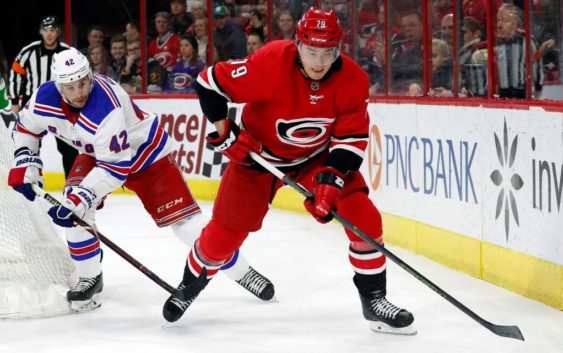- One set of evacuation orders lifted in Caldwell County after wildfire contained
- 'We gutted every building' | Chimney Rock rebuilding after Hurricane Helene
- 'We gutted every building' | Chimney Rock rebuilding after Hurricane Helene
- Debris from Hurricane Helene provides fuel, complicates containment for spring wildfires
- David & Nicole Tepper increase Hurricane Helene relief commitment to $750k
Hurricanes sit tight at deadline, caught between present and future

The NHL trade deadline went blowing past the Carolina Hurricanes yet again Monday, as they swayed in the breeze without being moved, not the first time they were spectators while the rest of the league went typically bonkers.
These are different circumstances from recent years, when the Hurricanes were unquestioned sellers and the previous regime often chose not to sell. This time around, they neither a borrower nor a lender were, and there are two ways to look at the Canes’ inaction.
The decision to keep Micheal Ferland – or, more accurately, trade him only for a player who could help the team immediately, those offers not being forthcoming – is a statement that the focus has shifted at least in part from the long term to the short term. The Hurricanes could have gotten some package of picks or prospects for Ferland that might have helped them down the road, but their performance in 2019 – 17-6-1 – has foreshortened the view of that road somewhat.
But the decision not to do anything else, to not pursue a rental player, to poke around at players under contract for the future but be unwilling to overpay for them in terms of picks or prospects to close a deal, suggests the focus is still as much on the long term as it ever was. This team, as currently constituted, may be on a hot streak, but it still doesn’t match up well with the other Eastern Conference contenders – especially down the middle, a vulnerability easily exposed in the multi-dimensional matchup chess of an NHL playoff series. If the Hurricanes even get there.
Sign Up and Save
Get six months of free digital access to The News & Observer
#ReadLocal
It’s hard to say which perspective was right, and only time will tell. But in trying to have it both ways, did they end up having it neither way?
It’s easy to say that there’s at least some belief that this team has a shot, or at least enough of one not to punt on Ferland, even if it means losing him for nothing as a free agent this summer. This much is certain: Now that the deadline has passed, they’ll get the best of whatever Ferland has to offer. He’s playing for big bucks now, no whammies, same as Sebastian Aho has been all season. Waddell said any discussions will be put off until after the season, and you can bet Ferland will want to put them off until the market opens July 1.
“We liked our team going into today,” Hurricanes general manager Don Waddell said, “and we’re going to end today liking it just as much.”
Still, there’s this apparent contradiction that Waddell and Tom Dundon believed in this team enough to keep Ferland as a de facto rental but not enough to go a little farther and wager any part of the future on the present.
To be fair, the right deal may not have been out there. Waddell made it clear they were looking at a lot of players, considered a lot of deals, and couldn’t make any work. As Ron Francis would be the first to point out, it’s hard to make a trade in the NHL. Especially under the time constraints of the deadline, and especially if the other team was facing cap constraints the Hurricanes are not. But there’s reason to believe there may have been a deal or two to be made if the Hurricanes were willing to budge a little, and they would not.
So the Hurricanes will go into the homestretch with Ferland, and with the addition of Nino Niederreiter, and with their overload of depth on the right side of defense intact, and hoping Jordan Staal can get back up to speed, in the belief that this team is good enough not to be weakened but not good enough to be worth strengthening.